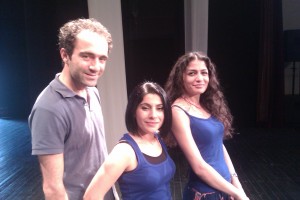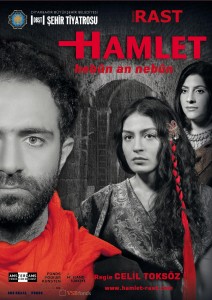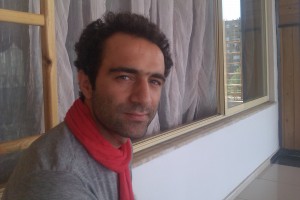(Dit verhaal schreef ik voor de Engelstalige site SES Türkiye, ik heb geen tijd het naar het Nederlands te vertalen, sorry.)
Rehearsals are under way for the world premiere of the Kurdish version of Hamlet, which will be performed in eight cities across Turkey at the end of the year to celebrate Kurdish language and promote a message of peace.
Shakespeare’s Hamlet has become more than a classic play to a group of busy artists, giving them a unique way to celebrate Kurdish language and culture and offer gesture for peace. “It is a dream come true to direct a Kurdish Hamlet,” director Celil Toksöz told SES Türkiye.
He recalled a Turkish politician who was quoted years ago saying Kurdish was not a real language and actors couldn’t be used to perform Hamlet. “I never forgot that,” he said. “Of course, you can perform Hamlet in Kurdish. It’s a very rich language and Kurdish is a very rich culture.” The upcoming performances are proof that the so-called “mountain language” is relevant, he said “This play is my way of singing my language out loud,” Toksöz said.
The rehearsals for the first ever Hamlet in Kurmanci, the Kurdish language spoken by most Kurds in Turkey, are in full swing at the Cegerxwin Cultural Centre in Diyarbakir. Hamlet and Laertes practice their fencing match, Ophelia’s funeral is done once again and Hamlet rejects Ophelia.
But this will not be a classical performance. The play has been modified and music plays a much bigger role than in the classical version. Parts of Shakespeare’s original text have been adapted into songs in the Kurdish musical tradition accompanied by traditional instruments, such as the daf and davul (percussion), the zurna (a woodwind instrument), saz and banjo.
Toksöz also included dengbej singers. In Kurdish tradition, dengbej is a melodious way of telling stories. Once on the verge of disappearing, the practice is being revived. The dengbej singers will guide the audience through the performance. They connect the scenes with introductions and commentary.
Toksöz said Hamlet is the right play at the right moment as its themes are current in Kurdish society. “One of the main emotions of Hamlet is doubt, and in extension to that revenge, love, betrayal, murder. Universal themes, but they fit the situation of Kurds very well,” he said. “Kurds are in doubt about their identity, about how Turkish they may have become, and about how to react to suppression. Should revenge be taken, should we accept the situation as it is, should we beg for our rights or take other action, and are we prepared to sacrifice lives for it?”
For Kurds, Toksöz said, it all comes down to the key sentence in Hamlet. “In Europe, where I live, the matter of ‘to be or not to be’ is something individual,” he said. “But for Kurds it’s about a whole nation. Do we choose to be or not to be? Do we choose to exist, or not to exist? And with which sacrifices?”
Toksöz, 52, came to the Netherlands in 1986, after growing up in the predominantly Kurdish cities of Diyarbakir and Elazig. He is now the artistic leader of Rast Theater in Amsterdam, and cooperates with the Diyarbakir City Theater to produce the Kurdish Hamlet. One of their actors, Yavuz Akkuzu, plays the title role.
Because songs are so important in this version, Toksöz decided to work with three professional singers for other key roles: Gülseven Medan plays Ophelia, Ali Tekbas (who also wrote all the music) plays Horatio and famous Kurdish performer Rojda is Gertrude, Hamlet’s mother. The play is scheduled to premiere October 17th in Amsterdam, then the troupe will tour in the Netherlands. A tour in Turkey will follow in early November, with performances slated for Istanbul, Izmir, Ankara, Diyarbakir, Van, Batman, Sanliurfa and Mardin.
In Turkey, the text will have subtitles for the audience. Toksöz said both Kurds and Turks will come see the play. “Besides celebrating Kurdish language and culture, I want to make a peace gesture with this play,” he said.

from left to right: Yavuz Akkuzu (Hamlet), Rojda (Getrude), Gülseven Medan (Ophelia). Click to enlarge.
Rojda told SES Türkiye she does not fear negative reactions in the wake of PKK violence. “People will come to the theater because they love plays, because they like Shakespeare, because they are curious about what it looks and sounds like in Kurdish,” she said. Rojda said she believes especially now, after this violent summer, that art is important. “Art can open doors to more understanding,” she said. “We keep hoping for peace and hope this Kurdish Hamlet can contribute to it somehow.”
In the Cegerxwin Cultural Centre, only short breaks are taken during the rehearsals, which started on September 1st and have to be completed October 14th, when the group flies to Amsterdam for the premiere. Akkuzu, the actor, says he is proud about his role, but nervous, too. “My Kurdish is good and I have performed in Kurdish plays before, but the translation was on such a high literary level that I didn’t always understand it,” he said.
He worked with the translator, Hawa Nemir, to use more ordinary Kurdish, which he said was better for him and the audience. The addition of music, especially dengbej, helps the actors convey the play’s meaning and emotions of the characters, he said. “It made my worries disappear,” Akkuzu said. “Now I feel very lucky to be in this play.”
Toksöz, the director, admits the performance is historic. “But I don’t think of that too much,” he said. “You know, when you are working hard, you forget everything around you. But yes, when after a day of rehearsals I turn on the TV and see the news which is full of violence, I do realize that gestures of peace are very necessary.”




Recente reacties